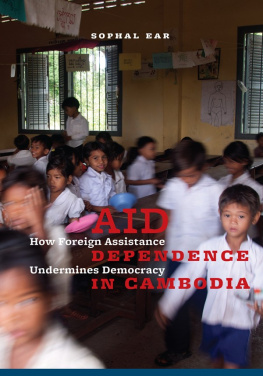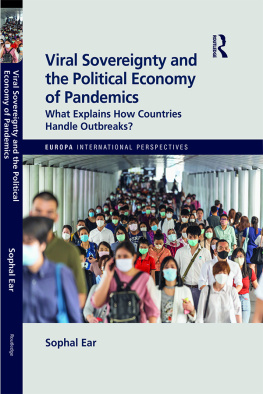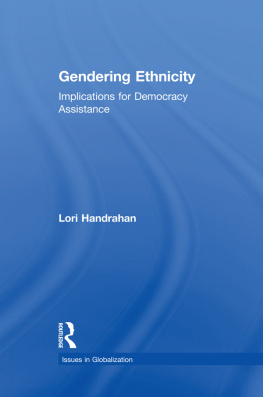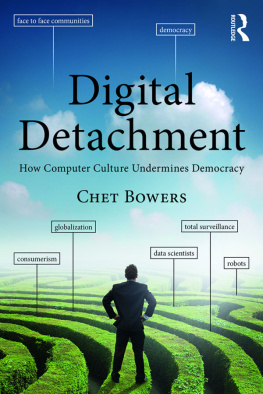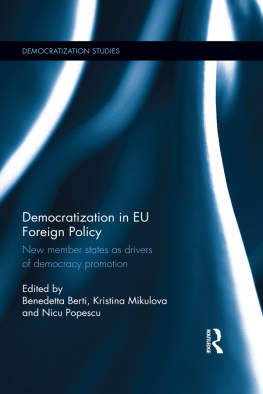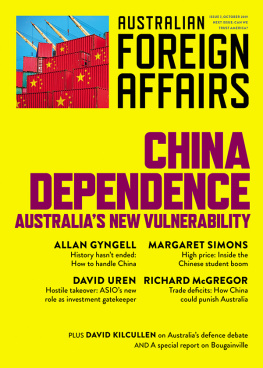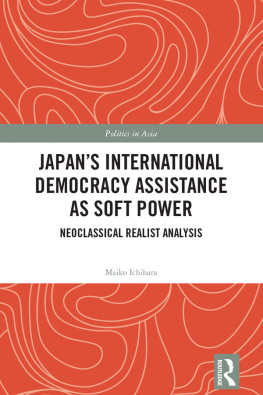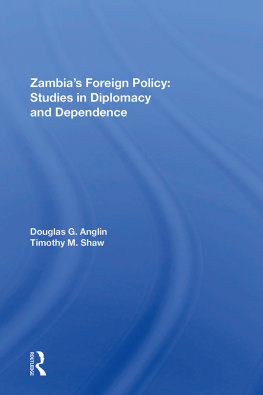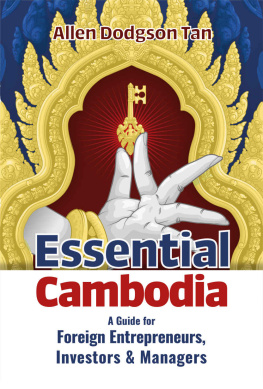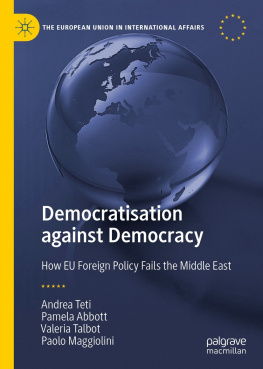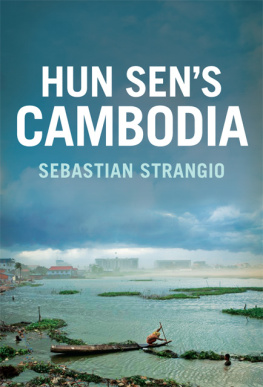Aid Dependence in Cambodia
SOPHAL EAR
AID
How Foreign Assistance
DEPENDENCE
Undermines Democracy
IN CAMBODIA
COLUMBIA UNIVERSITY PRESS NEW YORK
Columbia University Press
Publishers Since 1893
New York Chichester, West Sussex
CUP.COLUMBIA.EDU
Copyright 2013 Columbia University Press
All rights reserved
E-ISBN 978-0-231-53092-7
Chapter 1 is based on two articles that were previously published in the International Public Management Journal, 2007 Taylor and Francis, and the Asian Journal of Political Science, 2007 Taylor and Francis.
Library of Congress Cataloging-in-Publication Data
Ear, Sophal.
Aid dependence in Cambodia : how foreign assistance undermines democracy / Sophal Ear.
p. cm.
Includes bibliographical references and index.
Summary: Dr. Ear argues that the international community has chosen to prioritize political stability above all other governance dimensions, and in so doing has traded a modicum of democracy for an ounce of security. Focusing on post-1993 Cambodia, Ear explores the unintended consequences in post-conflict environments of foreign aid. He chooses Cambodia both for personal reasonswhich infuses an academic analysis with a compelling sense of urgencyand because it is one of the most aid-drenched countries in modern history. He tries to explain the relationship between Cambodias aid dependence and its appallingly poor governance. He concludes that despite decades of aid, technical cooperation, four national elections, no open warfare, and some progress in some parts of the economy, Cambodia is one broken government away from disaster.Publishers description.
ISBN 978-0-231-16112-1 (cloth : alk. paper) ISBN 978-0-231-53092-7 (electronic)
1. CambodiaPolitics and government1979. 2. DemocracyCambodia. 3. CambodiaEconomic conditions. 4. Economic assistancePolitical aspectsCambodia. 5. Technical assistancePolitical aspectsCambodia. I. Title.
DS554.8.E25 2013
320.9596--dc23
2012006792
A Columbia University Press E-book.
CUP would be pleased to hear about your reading experience with this e-book at .
References to Internet Web sites (URLs) were accurate at the time of writing. Neither the author nor Columbia University Press is responsible for URLs that may have expired or changed since the manuscript was prepared.
For my late mother, the twenty-one lives she saved, and the people of Cambodia
CONTENTS
Figures
Cambodias percentile rankings on six dimensions of governance (19962008)
Textiles and garments value chain
The spike in the price of rice in 2008 ($/ton freight on board)
Super Moan
Aid at a glance chartCambodia
Cambodias avian influenza and pandemic preparedness pie (20082009)
NGO bilateral, multilateral, and core/own resources ($ millions)
NGO core/own funds (19922012) ($ millions)
Tables
Transition of legal, political, and economic systems in Cambodia
The more aid-dependent a country, the lower the quality of governance
Six dimensions of governance
Royal government of Cambodia aid requests, donor pledges, and disbursements
Selected indicators of aid dependence in Cambodia
Informant ratings on donor success
Cambodias aid, tax, and domestic revenues (20002010)
Agriculture in Cambodia (20002010)
elite survey respondent codes
interview codes
interview and elite survey respondent codes
interview codes
AMONG THE MORE than 1.7 million Cambodians killed by Pol Pots Khmer Rouge were my father and eldest brother. When the peasant army marched into Phnom Penh on April 17, 1975, my parents lived in a three-story villa near the airport. My father, an army captain who owned a drugstore, was precisely the type of bourgeois the revolution intended to cull from the Cambodian population once and for all.
My mother actually owned the villa because her first husband had built it for her. It was so grand that Ly Bun Yim, one of Cambodias most famous film directors, shot his first feature, Ronteah Krousar (Thunder in the family), in the house. Mom had moved to Phnom Penh as a girl to live with her oldest sister, whose husband had been a government minister. He was also a congenital philanderer who began molesting my mother at age ten and forced her to marry him and become his second wife (concubine) when she was eighteen. He was at least twice her age, and she found other husbands elsewhere. One of them was my father.
The city buzzed with excitement that Thursday morning when the Khmer Rouge arrived in Phnom Penh. The bloody five-year civil war was over! Uncertain about what to expect, those who remained in the city hoped peace had arrived. What could possibly be worse than the American bombings? After all, more bombs had fallen on Cambodia since 1965 (2,756,941 tons) than were dropped during all of World War II by the Allies (just over two million tons of bombs). People cheered as sullen Khmer Rouge soldiers marched down the main boulevards in ragged black uniforms with rifles in hand. My family had planned to escape to Thailand, purchasing a fishing trawler for transport, but my father ultimately decided we would stay and take our chances.
As soon as the peasant army secured the capitals choke points, loudspeakers began to blare orders of an immediate evacuation. Soldiers went door to door and forced the entire city of 2 million to depart, telling citizens they had to leave because the Americans were about to bomb.
We left our Tuol Kuork neighborhood on foot, while my eldest brother went with our aunt and her husband, the former government minister, in their sleek Citron DS. We all spent the night in front of the airport because car traffic was terrible. The next morning, we were ordered to continue on foot to Kandal province; by then, my aunts family, which had claimed my eldest brother as their only child, went their separate way, never to be seen again. A week later, we were on a Khmer Rouge boat headed upriver to Tuol Prik in Pursat province, where my parents toiled in rice fields like human water buffalo. Because they were wealthy urban dwellers, they were labeled new people, the bottom rung of the Khmer Rouges new social order.
One day, my mother returned from plowing the fields when the commune leaders called a meeting to announce that Vietnamese nationals would be allowed to return home. When Mom heard this, she could only think of survival. She had already seen so many die from illness and exhaustion. I have to lie, I have to tell them Im Vietnamese, to get away from this place, she thought. She decided to put our name on the list. When the others warned her, Auntie, theyre lying, theyll kill you when you go back there, she replied, To stay is to die, to go is to die, so I might as well go.
It was several weeks before the repatriation process began, and safe passage would require not travel documents but mastery of the difficult Vietnamese language. Although my mother had grown up speaking Vietnamese with the servants, she had no way to know if it was enough.
We traveled on foot for three days to a place where trucks waited for us. The groups fear was palpablealthough some were Vietnamese, most were pretending, and many thought it was a trap. There was no way to know, and we were exhausted from the trip. In fact, my father resembled the walking stick he propped himself up on. Suffering from diarrhea and bedbug bites, he could barely move, and on the third night, he died. Ironically, his death saved us, because he spoke no Vietnamese and would have given us away. The next morning, the trucks took us to a locomotive that brought us to the train station in Phnom Penh, where Chinese four-wheel-drive vehicles transported us to Kandal province.


